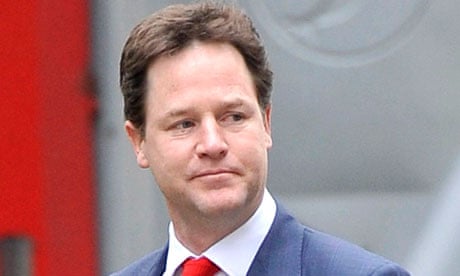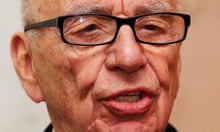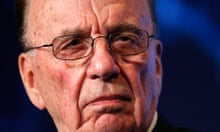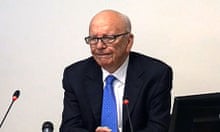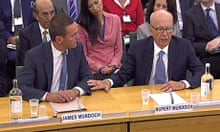Nick Clegg has said there are "big question marks" about Rupert Murdoch's fitness to run News Corporation in the wake of a damning House of Commons report on the phone-hacking scandal.
The deputy prime minister said the report, published on Tuesday, raised "serious questions of basic corporate governance in the Murdoch empire", which allowed its journalists to engage in illegal invasions of privacy on an "industrial scale".
The Labour leader, Ed Miliband, told Radio 4's World at One programme that regulator Ofcom needed to "add urgency" to its investigation into whether News Corporation met the "fit and proper" test that allowed it to own a stake in broadcaster BSkyB in the light of Tuesday's report.
During a visit to Fife before local council elections, Clegg threw his weight behind the culture committee's central findings: "What's striking about it is how much full, cross-party consensus there was behind a number of excoriating observations about how the Murdoch empire was run.
"Of course, that means there are very serious question marks about the basic accountability and corporate governance of an organisation which, as we now know, whilst it was denied for a long period of time, journalists were abusing the privacy of ordinary people and flouting the law in huge and sustained way."
He said he had yet to read the report in detail, but showed clear sympathy with the most controversial majority finding that Rupert Murdoch was not "a fit person" to lead News Corporation – a finding backed by the committee's sole Lib Dem MP, Adrian Sanders. He said: "Clearly that was the opinion of the majority of members of that committee.
"[I] don't think anyone can be in any doubt, whatever your opinion about that particular sentence, that there were some serious issues about basic corporate governance in the Murdoch empire. Because, as we now know, there were journalists in the Murdoch empire who were breaking the law, and abusing the privacy of victims of the 7/7 attack, of families of people who have lost loved ones in Afghanistan and the family of Milly Dowler, and that illegal activity was taking place on an industrial scale.
"Adrian Sanders is entirely free to do what he wants. As I say, the report shows that there are very, very big question marks about the way in which the Murdoch empire was run."
He also expressed strong support for the committee's expected decision to ask the Commons to censure three seniorNews International executives, Colin Myler, former editor of the News of the World, Tom Crone, the former News International legal manager, and Les Hinton, its former executive chairman, for misleading MPs on the hacking affair.
He said: "I think that the House of Commons has every right to make sure that where it's shown, and the select committee has made these assertions, that the house or committees of it have been misled, that the house has the opportunity to make that very clear and very forcibly clear to those individuals concerned."
He said the hacking affairs and the Leveson and committee inquiries had proven that politicians, the media and media proprietors had become far too close. He would never go to a Murdoch tea party, he said.
"I think it's important that the media and the political classes take a bit more distance from each other."
Clegg added: "What we need to do, on the back of the Leveson inquiry and on the back of the select committee report, is make sure that there's a permanent culture change in the set of relationships between the politicians and the media, and the police and media as well."
Alex Salmond has refused to confirm whether he was a hacking victim after coming under intense pressure from his Holyrood opponents to tell the Scottish parliament.
He was asked three times during rowdy scenes at first minister's question time by the Scottish Labour, Tory and Liberal Democrat leaders to state whether he had been hacked by Rupert Murdoch's News of the World, but each time refused to do so.
The continuing political pressure came ahead of a statement by the board of News Corporation which said it had met and announced its "full confidence in Rupert Murdoch's fitness and support for his continuing to lead News Corporation into the future" as its chairman and chief executive officer in a specially convened telephone call.
"The board based its vote of confidence on Rupert Murdoch's vision and leadership in building News Corporation, his ongoing performance as chairman and CEO, and his demonstrated resolve to address the mistakes of the company identified in the select committee's report," it added.
